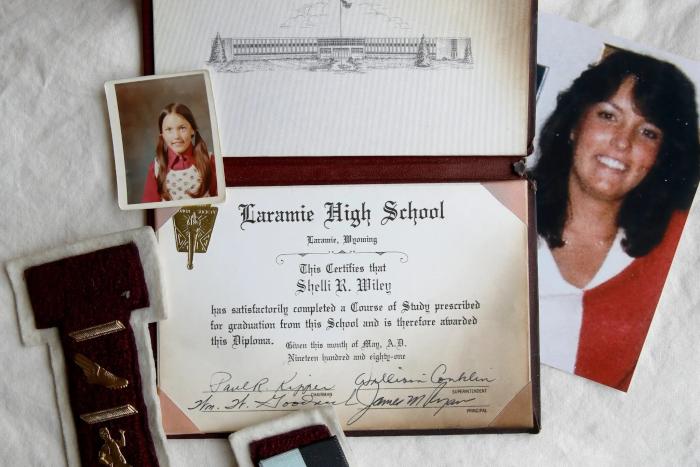By Dustin Rowles | Podcasts | March 9, 2023

The latest season of Serial is the podcast’s first to tackle a murder since the opening season investigation into the conviction of Adnan Syed. The Coldest Case in Laramie, however, is less a murder investigation and more of a meditation on memory.
Not that host, New York Times investigative reporter, Kim Barker doesn’t try to solve a murder. Barker grew up in Laramie, Wyoming, and was in high school with the victim, Shelli Wiley, when she was brutally murdered in 1985. Her apartment was set on fire, and when Wiley attempted to flee, her murderer pulled her back in and stabbed her multiple times. Her body, and most of the evidence, were destroyed in the fire. After the initial investigation, however, the case went cold until 2016 when a former cop named Fred Lamb confessed to the murder. Lamb still has not been tried for the crime.
Why a former cop who confessed to the crime and whose blood DNA evidence was at the scene has not been tried and convicted yet is the big mystery in The Coldest Case in Laramie, but by the end of the podcast’s eight episodes (which are all out now) conclude, most listeners will understand.
Kim Barker takes us through the entire police investigation, and both the Laramie police department and Fred Lamb’s defense attorney are surprisingly forthcoming. In fact, the detective who is currently investigating the case — cold cases pass from one sheriff to the next after they retire — strongly believes that Fred Lamb is their man. However, the prosecutor has not pursued the case, and the defense attorney is so convinced that his client is innocent that he hands over the entire case file — including all of the police interviews — to the podcast.
Given the decade and the part of the country, the fact that detectives essentially looked past a fellow cop was not surprising, nor is it surprising that they quickly turned their attention to people of color. The victim had a casual sexual relationship with a college football player, who is Black, so he immediately become a suspect, as did other Black players on the football team, most of whom had no relationship with her whatsoever.
There was also a Hispanic man who had a history of breaking into women’s rooms, and who has since died in prison, who became a suspect. A white teenager, who confessed to the crime after being arrested for a separate murder, has also been dismissed as a suspect. The podcast gets into his story, as well.
It’s a fascinating podcast, but the most insightful theme is that of memory. Kim Barker interviews people today and, quite often, their memories do not line up with notes or interviews the same people gave in 1985. The reason why Fred Lamb confessed is that the cops — after interrogating a senior citizen for over 7 hours — essentially convinced him that he committed the crime. Lamb says that he doesn’t remember killing Wiley, but he is so convinced by the cops’ evidence — some of which is exaggerated or fabricated — that even he concedes that he may have killed her and somehow blocked it out of his memory.
It’s a hell of a thing, memory. I clearly remember, for instance, the circumstances surrounding my father’s death many years ago, but I once spoke to my brother and he gave me a completely different account. My original memory is so powerful that it eventually overwrote my brother’s version of events and all I remember is my original memory and my brother telling me that it is wrong. I cannot say definitively what happened that day.
It’s like how half of us remember an ending to You’ve Got Mail that never existed, or even how many of us recall John Candy sitting down for Thanksgiving dinner with Steve Martin’s family at the end of Planes, Trains, and Automobiles (it didn’t happen). Our minds can create false memories and they can be so convincing that we can be talked into confessing to murder.
Then again, maybe the former cop did commit the murder. Despite eight episodes worth of evidence, however, the world will probably never know exactly who killed Shelli Wiley because too much of the case depends on memory, and memory is the most unreliable narrator of all.